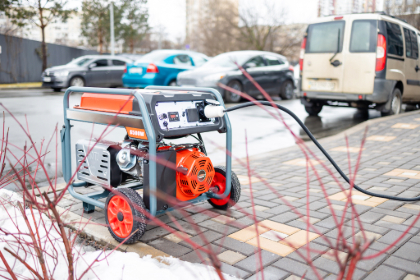INDEPENDENT DEALER
Myrtle Beach, SC | (336) 247-0212
High Point, Greensboro & Mooresville, NC
OUR BLOG
When winter storms threaten Mooresville Synthetic Oil in Mooresville, NC, proper generator maintenance ensures your backup power starts reliably during critical outages.

When winter storms sweep through Mooresville, power outages can leave families in the dark for hours or even days. A properly maintained backup generator means weathering the storm comfortably or facing a cold, dark emergency.
1. Test Your Generator Monthly (Even During Good Weather)
Many homeowners discover their generator won't start when they need it most. Running your generator for 15-20 minutes monthly keeps internal parts lubricated and identifies problems before storms arrive.
Check for unusual noises, vibrations, or warning lights during these test runs. Listen to how the engine sounds - smooth operation indicates good health, while rough idling suggests maintenance needs. Regular generator maintenance during calm weather prevents emergency failures when storms hit.
2. Change Oil and Filters Before Storm Season
Old oil becomes thick and contaminated, making cold-weather starts difficult or impossible. AMSOIL synthetic oils flow better in freezing temperatures, ensuring your generator starts quickly when needed.
Replace the oil filter with each oil change to remove trapped contaminants. Check your air filter too - a clogged filter strains the engine and wastes fuel. Clean foam filters can be washed and re-oiled, while paper filters need replacement when dirty.
Call Mooresville Synthetic Oil in Mooresville, NC at (336) 247-0212 or visit AMSOIL's online store to find synthetic oils specifically designed for reliable cold-weather generator performance like AMSOIL 5W-30 100% Synthetic Small-Engine Oil.
3. Stabilize Your Fuel Supply
After just 30 days, gasoline begins breaking down, forming varnish that clogs carburetors and fuel systems. Add fuel stabilizer to your generator's tank and any stored fuel containers.
To properly winterize home generators, keep the fuel tank full to prevent condensation. Water in the fuel system causes severe damage and prevents starting. If storing gasoline, use approved containers and rotate your supply every few months.
4. Inspect and Clean Electrical Components
Check all electrical connections for corrosion or looseness. Clean battery terminals with a baking soda solution and apply dielectric grease to prevent future corrosion.
Test the battery voltage - it should read 12.6 volts or higher when fully charged. Cold weather reduces battery capacity by up to 50%, so a weak battery that works in summer may fail in winter. Replace batteries older than three years before storm season.
5. Protect Your Generator from the Elements
Your generator needs protection from snow, ice, and rain while maintaining proper ventilation. Never run generators in enclosed spaces—carbon monoxide kills quickly and silently.
Build or buy a generator shelter that keeps precipitation off while allowing exhaust gases to escape. Position your generator at least 20 feet from doors, windows, and vents. For added safety, install a carbon monoxide detector in your home.
For synthetic oil for emergency power equipment that ensures reliable starts in freezing conditions, contact Mooresville Synthetic Oil in Mooresville, NC at (336) 247-0212 or visit AMSOIL's online store.
6. Stock Essential Supplies Before Storms
Proper generator maintenance includes gathering necessary supplies before emergencies. Keep extra oil, filters, and spark plugs on hand - stores often sell out when storms approach.
Store enough fuel to run your generator for at least 72 hours. Calculate your fuel consumption during monthly tests to determine your needs. Don't forget oil for oil changes—generators require frequent oil changes during extended operation.
7. Create a Power Priority Plan
Determine which appliances and systems to power during outages. Your generator likely can't handle everything simultaneously, so prioritize essential items:
- Refrigerator and freezer (to preserve food)
- Heating system (for winter survival)
- Well pump (for water access)
- Medical equipment (if needed)
- Basic lighting and communication devices
Calculate the total wattage needed and ensure it doesn't exceed your generator's capacity. Overloading damages both the generator and connected appliances.
8. Know Your Transfer Switch Options
Proper equipment is required to connect your generator safely. Portable generators need heavy-duty extension cords rated for outdoor use. Never plug generators directly into wall outlets—this dangerous practice, called "backfeeding," can electrocute utility workers.
Consider installing a manual transfer switch for seamless power switching. This investment allows you to safely power hardwired appliances like furnaces and well pumps. Some areas require professional installation to meet electrical codes.
Maintaining Readiness Year-Round
Keeping generators ready for storms requires year-round attention, not just pre-storm panic. Mark your calendar for monthly tests and seasonal maintenance tasks. Keep a maintenance log noting run times, oil changes, and any repairs.
Document your generator's model number, serial number, and manual location. During power outages, you'll appreciate having this information readily available. Take photos of the control panel and connection points for quick reference in the dark.
Store your generator with fresh oil and stabilized fuel. A well-maintained generator provides 10-20 years of reliable service, protecting your family through countless storms. Investing time in proper generator maintenance pays dividends when severe weather strikes.